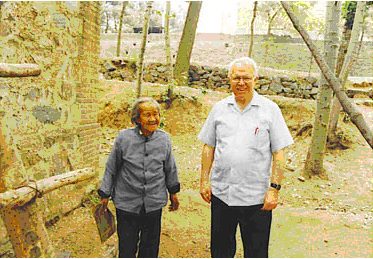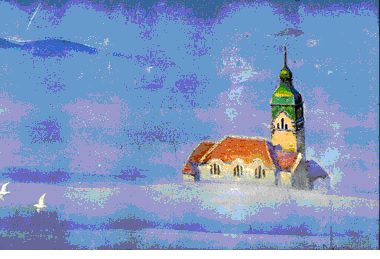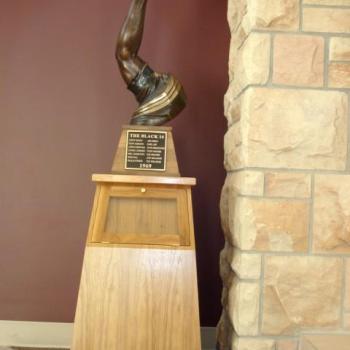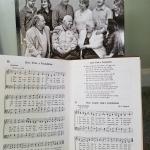“Do you actually believe in GOD? Do you PRAY to him? Do you think he lives in the clouds?”
These were the chants of my parents’ students in Shandong, China upon learning that Mom and Dad were Christians. The questions mocked–as though the askers had been collectively coached in how to deride religion. But outside the classroom, the questions and the tones changed.
The year was 1980, just a decade after the Cultural Revolution. Mom and Dad, accompanied by my baby sister (Carol), were teaching English for a year in the Jinan province. Mao Zedung’s approving face was everywhere–painted in posters and on walls; sculpted in larger-than-life statues; looming over the landscape on billboards. The “Little Red Book”–Quotations of Chairman Mao–was as ubiquitous as a Bible in Alabama, and so were the slogans: “Long Live Chairman Mao!” “Communism is the hope of the masses!”
But things were changing.
Though neither the year before nor the year after were students free to visit their American teachers’ apartments, that particular year was an exception. My parents’ apartment became a sanctuary where individual students, once certain that the Blairs could be trusted, would ask if they really believed, and would sometimes confess, “I too am a believer,” or “My grandmother is a Christian.” One young man, Cheng Shan, plaintively asked my father, “Mr. Blair, tell me–is there life after death? Does our soul live on after we die?” Dad bore his testimony: “Yes, our soul lives on. It is true.” Cheng Shan replied with burning emotion, “I knew it was true. It has to be true. They lied to us. They taught us there is no life after death. Oh Mr. Blair, my mother died a year ago, but I know she is somewhere. I have seen her in my dreams. She is somewhere. I know it!”
Another student introduced Dad to “The Artist of the Poor.” The government had assigned this young artist to factory work, but he had refused. With smuggled brushes and paint, using whatever canvas he could find–often the backs of boxes–he painted the China he saw: poor, naked children on a beach; a crippled man; himself as a lone, leafless tree in a wilderness. He showed my father a painting titled “The Hope of China.” It depicted a church. As the artist described it, the church sat above “a wicked city” which was covered by clouds. He gave his work to my parents, asking that they find someone in America to evaluate it, since nobody in China would look at it.
As Christmas neared, Mom and Dad learned that a great event was about to be realized. A Christian church which had been closed in 1949 and turned into a factory was scheduled to be restored and re-opened. Believers were invited to a Christmas ceremony when the church was returned to the faithful.
I have wondered what was involved in that restoration. Had some devoted worker scraped away the paint of Mao’s smile to reveal a cross? Had the familiar hairline been shaved from the wall to show a crown of thorns? Or had pictures of Mao simply been removed and the walls painted over? Whatever was involved, the church was not quite ready for Christmas, for the paint was still wet. The believers were ready for the church, however, and would not be kept away.
They were mostly old women, and came from all corners of town, sometimes in clusters; sometimes alone. Most wore the common, drab blue, Mao uniforms, though there was nothing common about this congregation. They were gathering publically for the first time since the Communist Revolution. The early arrivals started singing hymns in Chinese. Mom recognized the melodies and sang in English.
O Come All Ye Faithful…
And still they came. More and more of the faithful.
Joyful and triumphant…
A small, aged woman spoke to my mother. Her translator said, “It was your missionaries who gave us this church. Thank you for your missionaries.”
O come ye, o come ye to Bethlehem!
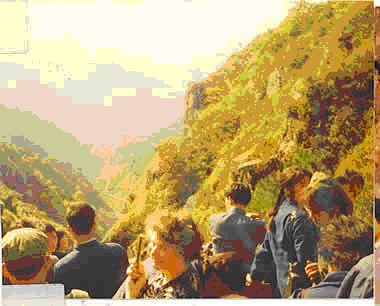
It had been thirty years since these Chinese Christians had been able to sing the carols aloud and together, but they knew the words. They had kept the faith.
The church door remained locked because of the wet paint. Despite that, believers proclaimed their joy in hymn and prayer for over an hour. There were no sects on this day; there was one Christ and one small, locked church.
1980 was the year when the “Gang of Four”–blamed for instigating the Cultural Revolution–was prosecuted in Beijing. Shandong’s university students watched a little television, laughing loudly as the emaciated convicts were put on display.
“How can you laugh?” my mother asked. “They look sad and sick. They’re pitiable.”
“You don’t understand,” said a male student in very good English. “You did not know them before. You did not see them in their power. You did not see their haughtiness. To see them now, like this–we must laugh! The mighty are fallen!”
Even Mao, eventually, would be largely removed from his pedestal. More churches would be restored. My parents would witness the transformation on later visits to China. Dad and my brother Bobby would be in Tiananmen Square one week before the tragedy there. They would not hear the speech of Dad’s former student at the Tiananmen platform, but they would help sponsor him once he escaped China. He would have been killed had he remained.
This particular student had been especially curious about religion in 1980. He had asked questions which grew more and more specific, until Dad explained the LDS faith to him. One night, in the refuge of the Blair apartment, the student said he wanted to be baptized.
“You could lose everything you’ve worked for,” Dad told him.
“I will give it away.”
“You would have to be baptized on the darkest night, in secret. You could never tell anyone.”
“I want to be baptized at noon on the brightest day in China, and I want to shout it to the world.”
Dad wrote Church Headquarters for permission to baptize the young man he called “Ben.” The time was not yet right, the answer said. Permission was denied. The paint, as it were, was still wet. Be patient.
Ben was baptized once he came to the United States as a political refugee.
Many Christmases ago in China, Mom directed a set of students in Charles Dickens’s A Christmas Carol–performed in English. I heard that the Chinese cast made Ebenezer Scrooge and all the ghosts of Christmas as complex and full as Dickens ever intended.
I can only imagine. The students are wearing the best costumes they can improvise–a long coat and a knitted hat on Scrooge, paper chains on Marley, a black robe on the Ghost of Christmas Future. A small pine tree stands mid-stage, and a tinsel garland is draped over the entry. “I am not the man I was!” says this Chinese Scrooge with careful enunciation. “Good spirit, assure me that I yet may change these shadows that you have shown me! I shall live in the past, present and the future. The spirits of all three shall strive within me! I shall not shut out the lessons that they teach! I will keep the spirit of Christmas!”
To me, the words sound like the private promises made by many Chinese Christians when Christmas was concealed by the Bamboo Curtain. They sound like the yearnings of so many who have been taught that there is no God, no life after death. They sound like hope.
Indeed, the hopes and fears of all years, all places, and all people were answered in a manger.
No ear may hear his coming; But in this world of sin,
Where meek souls will receive him, still the dear Christ enters in.
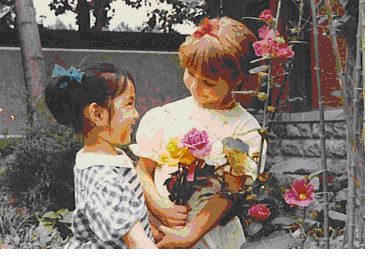
In reflecting on these words, my father wrote:
How different this gentle, unobtrusive, compassionate revolution is from the violent, self-serving revolutions in which tyrants set out to demand loyal under penalty of death or imprisonment, and set about to change by force the nature of Man and Society. Yet we believe it is this quiet revolution alone which has the power ultimately to truly change Man and Society. How many of us found opportunity to tell our students that where we come from, Christmas is far more than secular carols, colored lights, and Christmas presents? Or that Easter is about more than bunnies, colored eggs and a celebration of a season change? Or that Thanksgiving Day is about more than turkey, cornucopias and football? Truly we have been welcome messengers of peace and good will. We have cut through the bonds of ethnicity, and we have woven bonds of trust and friendship. And through this, we have come closer to seeing Man, our precious brothers and sisters on this earth, as God must see us all, shorn of skin color or ethnicity or nationality.
The light of the gospel is a constant, pervasive force. It will not be extinguished, and will prove to be bright enough and strong enough to fully dry the paint of preparation. Soon, more doors–public and private–will open, so that all of God’s children may seek and find the little town of Bethlehem, the babe in the manger, the Christ.
Note: I published a version of this a decade ago in Meridian Magazine. Originally, my words said, “This past Christmas, Mom directed Chinese students. . .” We are blessed to have my father still with us, though China is long in the past. Dad will complete nine years on dialysis in the Provo Davita center in February, 2015. The fact that kidney failure prevented him from remaining in China any longer was a deep trial for him.


